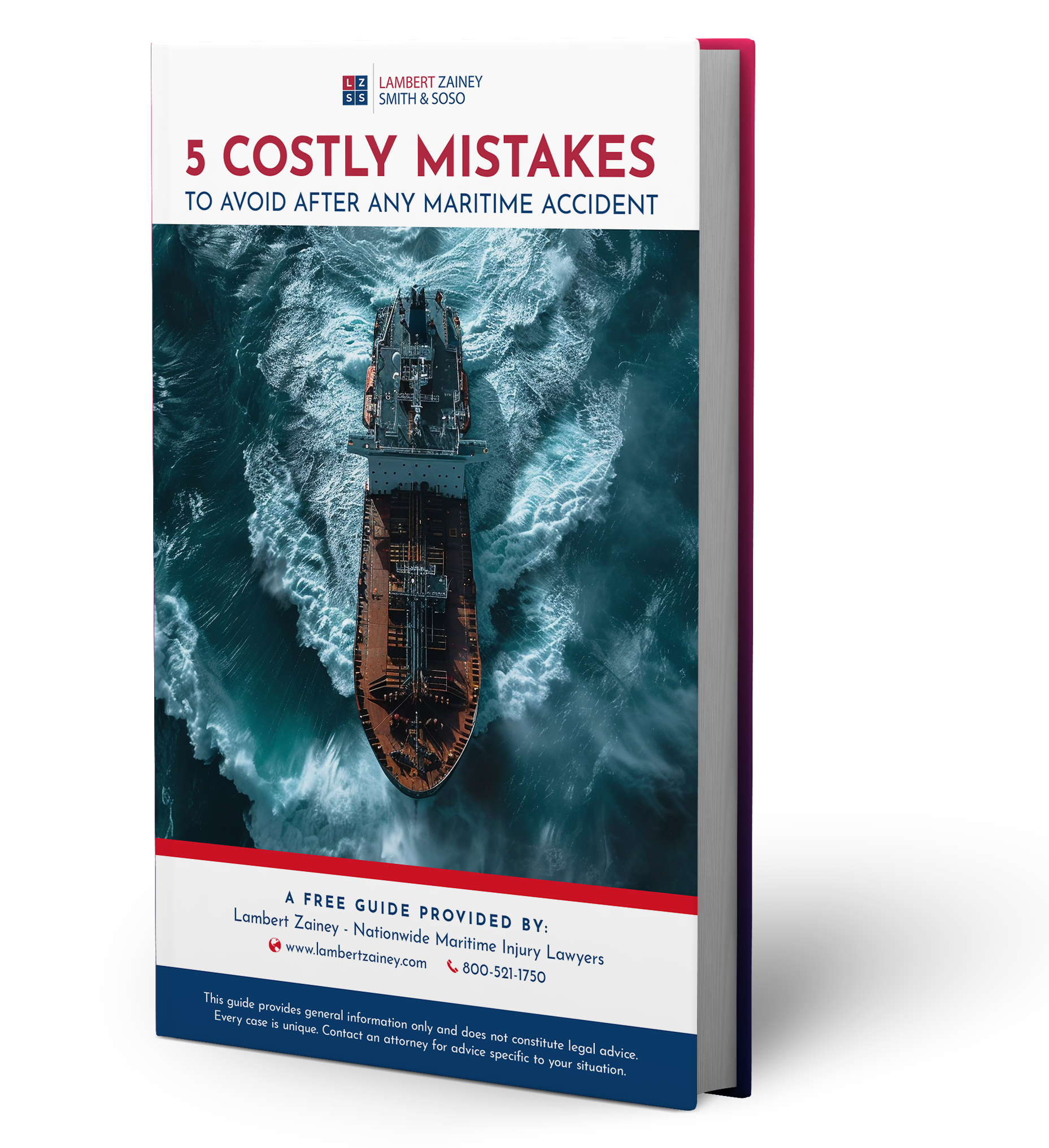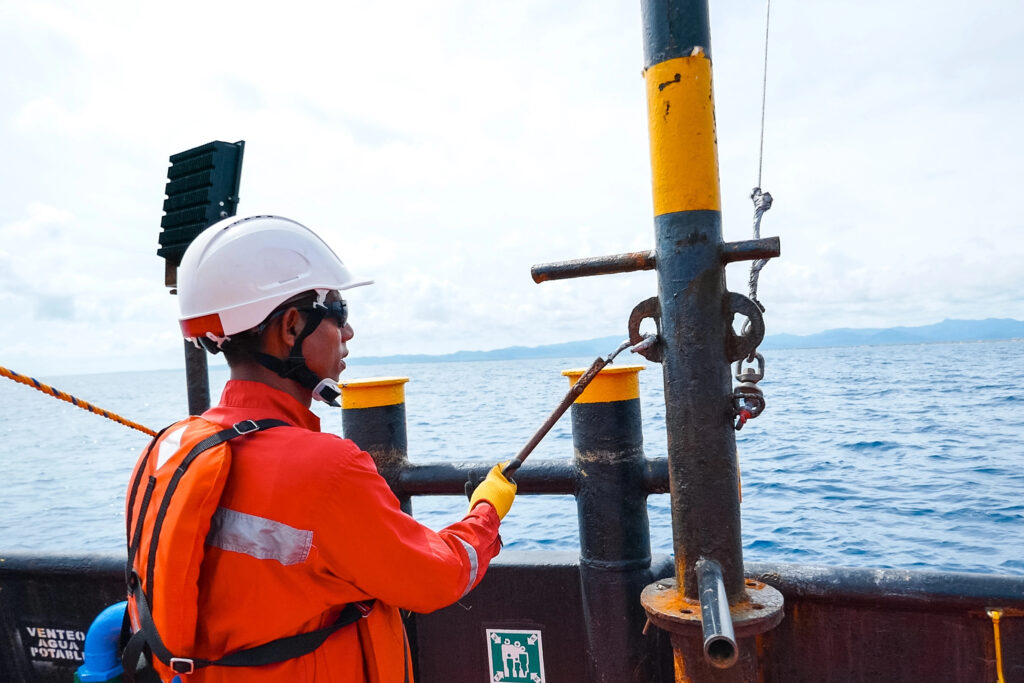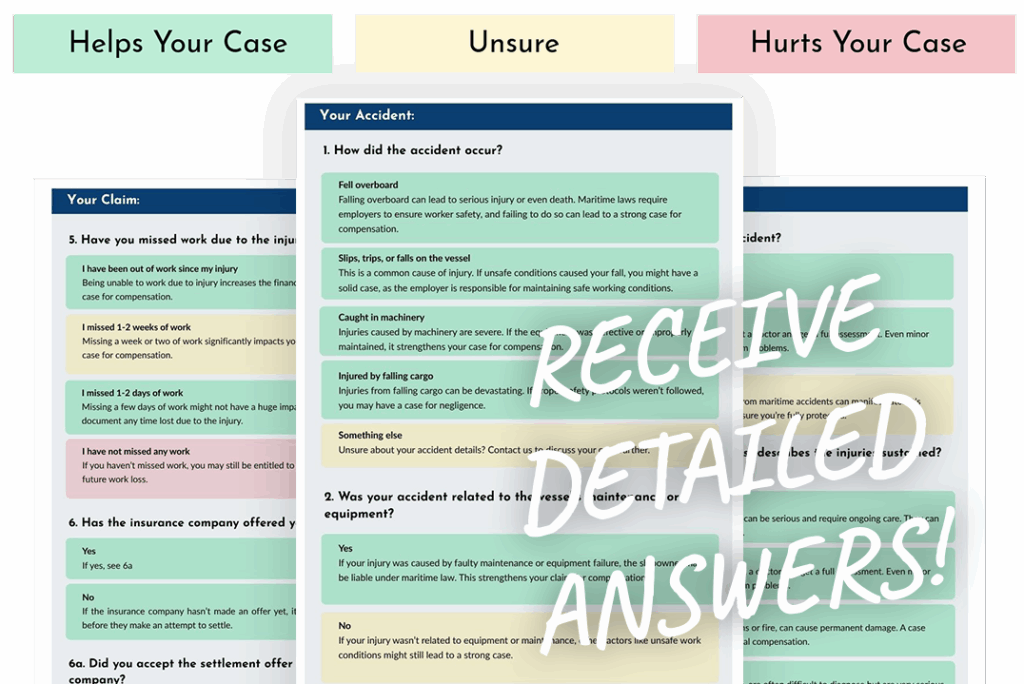Maintenance and Cure
Over $1 Billion Recovered for Maritime Accident Victims. We are proud to have a reputation for aggressively fighting for the rights of injured workers.
Maintenance and Cure Lawyers in New Orleans – Help for Injured Seamen
If you’re a seaman hurt while working for your vessel, there’s a basic, very old maritime right you need to know about: Maintenance and Cure (M&C). This is super important because it helps cover your basic living costs and medical bills while you recover – and it doesn’t matter who caused the injury.
But getting the full M&C benefits you’re owed isn’t always easy. Companies or their insurance might try to pay less, deny needed medical care, or push you back to work too soon. The experienced New Orleans maritime lawyers at Lambert Zainey know how crucial these benefits are. We fight hard to make sure injured seamen get every penny they’re entitled to under the law.
Having Problems Getting Maintenance & Cure? We Can Help.
On This Page
What Are Maintenance and Cure? A Seaman’s Basic Right
Maintenance and Cure is one of the oldest rules in maritime law. It recognizes that working at sea is dangerous and that employers need to take care of their injured crew. It has two parts:
The most important thing: M&C is “no-fault.” You get these benefits even if the injury was your own mistake or just an accident. The only exception is usually if you intentionally hurt yourself (which is rare and hard for them to prove). You just need to show the injury or sickness happened while you were working for the vessel.
Who Gets Maintenance and Cure?
This right belongs specifically to workers who legally count as “seamen.” Generally, this means your job helps the vessel do its work, and you spend a good chunk of your time working on a vessel (or group of vessels) that’s operating. Find out more about who counts as a Seaman on our Jones Act page.
If you got hurt or sick while “in the service of the vessel” – meaning while you were generally on call or doing things for the boat, whether you were physically on it, ashore on leave, or sometimes even traveling to/from it – you likely qualify for M&C.
“Maintenance”: Help Paying Your Bills While Recovering
Maintenance payments help cover your basic living costs on land, replacing the room and board you’d get on the vessel.
What Bills Does Maintenance Cover?
Usually, it covers necessary costs like:
How Much Maintenance Should You Get?
This is where fights often happen. The amount should cover your actual, reasonable daily living costs. But, companies often try to pay a really low daily rate (like $15, $30, or $40 a day), based on old union contracts or just because they want to save money. That’s often not enough, especially in places like New Orleans.
Lambert Zainey knows how to fight against lowball maintenance rates so you get enough to actually live on while you recover.
“Cure”: Getting Your Medical Treatment Paid For
“Cure” means your employer has to pay for the medical care you need for your work injury or illness.
What Medical Care is Covered?
Cure should cover reasonable and necessary medical help, like:
Can You Pick Your Own Doctor?
Generally, yes. The company might send you to their doctor first, but injured seamen usually have the right to choose their own doctor for ongoing treatment under Cure. Your employer can’t just refuse to pay for your chosen doctor’s recommended treatment because they want you to see someone else. It’s important to tell your employer who you’re seeing and make sure the treatment is needed for your work injury.
How Long Do M&C Benefits Last? (Maximum Medical Improvement – MMI)
You keep getting Maintenance and Cure until you reach Maximum Medical Improvement (MMI). MMI means your medical condition is as good as it’s going to get – more treatment isn’t expected to make you physically better. It does NOT mean you’re 100% healed or ready to go back to your old tough job.
We fight hard when companies try to cut off benefits too early by saying you’re at MMI before you really are.
Your Employer MUST Pay Quickly
Maritime law is strict: employers have to look into your M&C claim quickly and start paying if it seems clear you’re entitled to it. They can’t drag their feet or deny payment just because they’re checking small details. If there’s any doubt, the law usually says they should pay the seaman.
Over $1 Billion Recovered for Maritime Accident Victims

Oil storage tank rupture at the Murphy Oil USA refinery in Chalmette, LA. The fastest class certification and resolution of a case of its type and magnitude to date.

Arco cryogenic platform explosion caused by improper cold cut of Southern Natural Gas pipeline. Settlement for the injured and deceased in approximately twelve months.
Common Problems & Company Tactics with M&C
It should be simple, but companies often try to save money. Watch out for:
Get Our FREE Guide to Protect Your Claim
What you do after an accident is critical. Insurance companies will try to get you to make mistakes that can hurt your claim. Our free guide can help you avoid these traps.
Download our complimentary guide: “5 Costly Mistakes to Avoid After Any Maritime Accident” to arm yourself with the knowledge you need to protect your rights.
What if Your Employer Unfairly Denies M&C? (Getting Extra Damages)
If your employer refuses to pay Maintenance and Cure without a good reason, and they are being stubborn or unreasonable about it, you might be able to sue them for more than just the benefits they owe you. You could potentially get:
This gives companies a strong reason to do the right thing and pay M&C fairly.
How M&C Fits with Jones Act / Unseaworthiness Claims
It’s really important to know that Maintenance and Cure is separate from other claims you might have, like under the Jones Act (if your employer was negligent) or for Unseaworthiness (if the vessel was unsafe).
You can (and often should) get M&C benefits while you are also suing under the Jones Act or for Unseaworthiness. Taking M&C payments does not stop you from filing these other important lawsuits.
Why You Need an Experienced Maritime Lawyer for M&C Problems
Maintenance and Cure is supposed to be a simple, automatic right for injured seamen. Unfortunately, employers and their insurance companies often try to save money by making it as difficult as possible for you. They count on you not knowing all the rules. This is where having an experienced maritime lawyer from Lambert Zainey on your side makes a huge difference.
An attorney levels the playing field and protects you from common company tactics. Here’s exactly how we step in to fight for you:
Common Questions About Maintenance and Cure
If you’re hurt while working at sea, you may be owed maintenance and cure to help with living costs and medical bills. This section answers key questions so you know what to expect and how to protect your rights.
What Our Clients’ Say About Us
NATIONALLY RECOGNIZED ATTORNEYS
CONTACT US
Our experienced attorneys are here to guide you through every step of the process, from initial consultation to settlement or trial.
Free Case Review
Fill out the form below to contact Lambert Zainey and schedule a free, confidential consultation and discuss your case with an experienced attorney.























